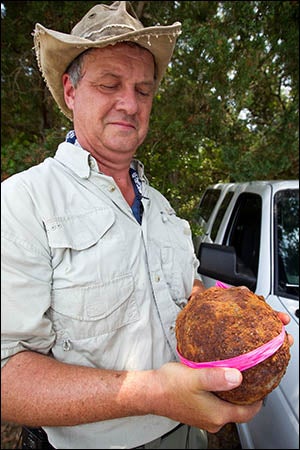ECU producing nation’s highest number of professional archaeologists

At left, Shanna Daniels, QAR project conservator steadies the cannon while Lawrence Babits, center, former director of the ECU maritime studies program, and Charles Bowdoin, an ECU student at right, work to position the cannon on a block in the holding tank at ECU’s QAR Conservation Lab. (Photo by Cliff Hollis)
East Carolina University’s graduate programs are producing more professional archeologists than any other program in the nation, according to a recent listing in the Society for American Archeology.
A recent analysis titled “The Register of Professional Archaeologists” ranked ECU number one on the list of the top 10 graduate institutions in the U.S., ranked by number of applicants to the Register of Professional Archaeologists. The data cited is statistically valid for the years 2010-2012.
ECU is one of only a few graduate institutions in the nation offering an interdisciplinary master’s degree in maritime history and nautical archaeology. Other professional archaeologists from ECU hold degrees in anthropology.

Dr. Charles Ewen, ECU professor of anthropology holds a cannon ball from the site of an archaeological dig at Fort Macon.
The recent ranking came as a surprise to Bradley Rodgers, director of the program in maritime studies, which is housed in the Thomas Harriot College of Arts and Sciences’ Department of History.
“This is a bit like picking up a newspaper and seeing that our football team has been ranked number one for two years without us knowing about it,” said Rodgers. “Since the register is the equivalent of a guild card, it is logical to assume that we are producing more professional archaeologists than any university in the country.”
“The fact that many of our MA archaeology grads are applying to RPA confirms that the training they receive at ECU meets the professional standards required to be listed on the register,” said Randy Daniel, interim chair of the Department of Anthropology.
“Prospective employers of archaeologists – including state and federal agencies as well as private companies – look to the register to identify those archaeologists that meet established professional standards.”
Researchers in archaeology must apply to become members of the RPA, though not all applicants are accepted. The RPA expects its members to have high standards of research performance and adhere to a specific code of conduct.
Within the standards of research performance, the RPA requires members to design and conduct projects that will add to the understanding of past cultures, while causing “minimal attrition of the archaeological resource base.”
ECU graduates of the maritime history and nautical archaeology program can secure jobs as contract archaeologists, government cultural resource managers, museum archaeologists, curators, museum directors, national and state park staff, conservators and educators.
Graduates of ECU’s master of arts in anthropology are offered a global view of human evolution, adaptation and culture, which allows them a better understanding of the archaeological, biological and cultural aspects of human diversity. Anthropology graduates secure careers in local and federal law enforcement, national park service, death scene investigation, cultural resource management, social services research, health-care program management and as educators.